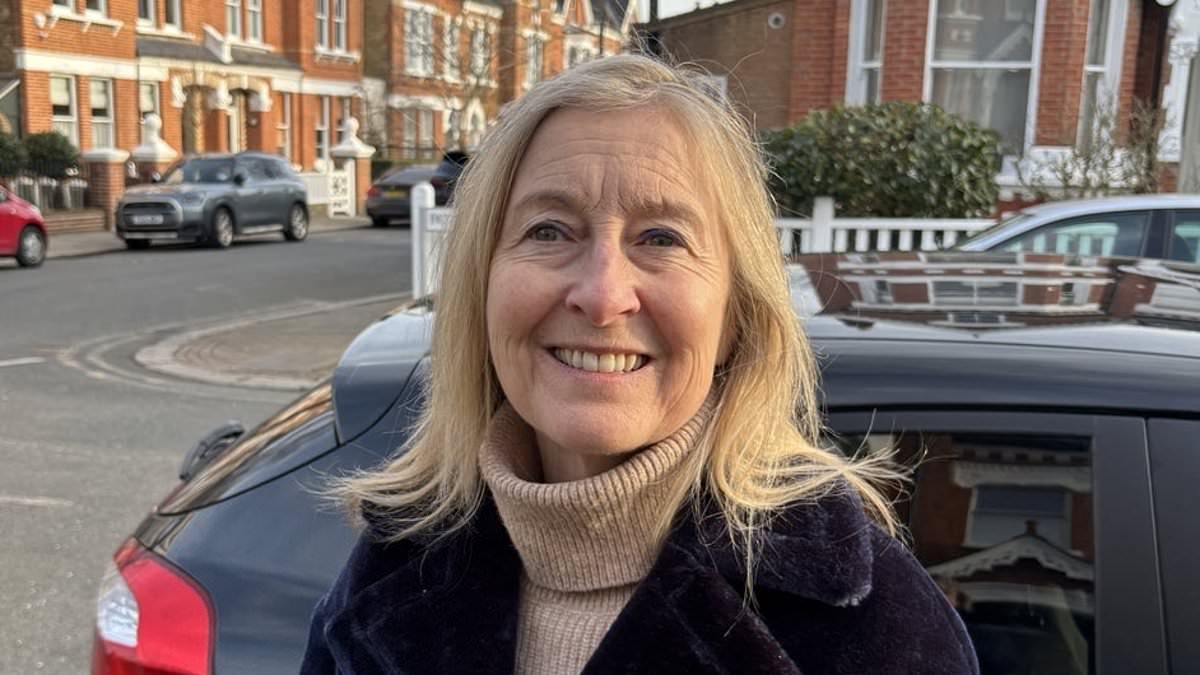Fiona Phillips’ husband has said his Alzheimer’s-hit wife ‘used to have good days and bad days – now it’s just bad or wretched days’.
Ms Phillips was just 61 when she found out in 2022 that she had early-onset Alzheimer’s.
Since then the 64-year-old has been cared for by her husband, former This Morning editor Martin Frizell.
Mr Frizell made the comment in a new interview with BBC Newsnight in which he spoke candidly about the former GMTV presenter’s battle with the memory-eroding condition.
He said: ‘I used to say good days and bad days, now I just say bad days or wretched days, I think wretched is a great word for it.’
Mr Frizell said the day of the interview the couple had gone to see a doctor and Ms Phillips was repeatedly unable to remember their destination.
‘In the cab ride, 35 minutes, she asked me 72 times, where are we going?’ he said.
He also said that his wife is no longer able to drive herself ‘because she panics’ and he is fearful of taking her on public transport because ‘she doesn’t look any different’ which might lead strangers to approach her – something which would leave her ‘flummoxed’.
The couple, who wed in 1997, share two sons who are also involved in looking after their ailing mother.
On July 17 Phillips released a new book, Remember When: My Life With Alzheimer’s, written with the help of Mr Frizell and journalist Alison Phillips, a long-standing friend.
The tome is described as an attempt to ‘chronicle what was happening to her in the hope that her book would help others.’
In the Newsnight interview, Mr Frizell talked movingly about his wife’s deterioration as he watched her lose interest in things that previously brought her pleasure like cooking and her wardrobe of ‘wonderful clothes’ that now mean nothing to her:
He said: ‘She hasn’t really cooked for two years. I was saying to somebody the other day, the most heartbreaking thing, lots of heartbreaking points in our lives just now, but downstairs in a basement, I’ve got a door wedged open by cookery books, and I don’t know what to do because she’s never going to cook again.
‘Do I donate them? Do I take them to the dump? What do I do with them? Same with her clothes as well.
‘She will wear, and everybody who has got someone who’s going through dementia will know this, we are just pretty much sharing our experience; she’s got the most wonderful wardrobe of wonderful clothes, but she’ll wear the same thing, the same t-shirt, the same pair of trousers, sleep in it if need be.’
Mr Frizell also says that as shocking as it may sound, he wishes his wife Fiona had contracted cancer rather than Alzheimer’s.
He said: ‘At least she would have had some hope, hope of, and I know you’ve been through it and it’s awful, my mom died from it, my father had cancer, so I know what cancer can do, but I don’t think Fiona’s ever going to be able to taste a glass of wine again, walk on a beach properly again, go on holiday again, go to the theatre, go to cinema, drive her car, cook a meal for her children, and my worry is on her deathbed, whenever that may come, and hopefully it will be in a long time from now, will she even know who we are?
‘I think with cancer though, of course it can be awful and I’m not trying to put that down, but at least there’s a hope, there’s the chance remission can take you to the end of your life. There’s no remission for Alzheimer’s.’
Mr Frizell also touched on the level of attention given to cancer and cancer care compared to Alzheimer’s.
‘For every one Alzheimer’s researcher, there are four cancer researchers,’ he said.
‘I’ll tell you what I think. I mean I’m not campaigning about this. I’m not going to be the poster boy for this.
‘This is pretty much all we’re going to talk about, as well as the book, that’s it. But again, this HS2, it cost a billion pounds a mile. If you give a billion pounds to Dr. Catherine Mummery at UCLH, I bet we’ll come up with something.
‘And this is, as you said, a third of us are going to get it. Of every baby that’s born this week or today, one in three of them is going to get this.
‘If this was a COVID disease that came out, that was going to wipe out a third of humanity, we’d come up with some sort of answer quite quickly, wouldn’t we?
‘But this is 120 years now and nothing has been done in Alzheimer’s because, well, “They’ve had a good life.”
